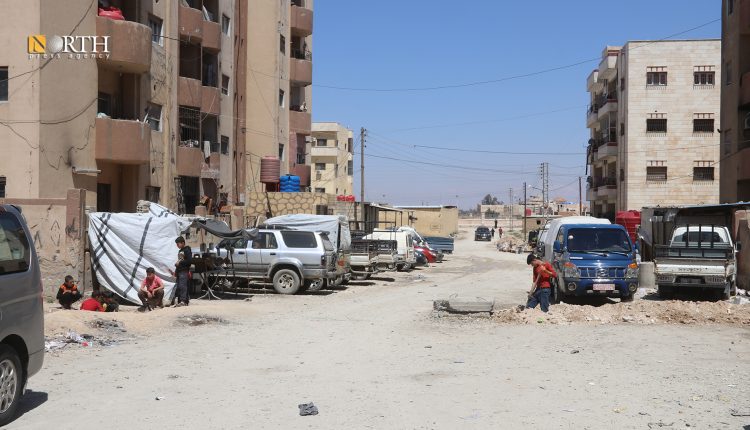
By Dilsoz Youssef
HASAKAH, Syria (North Press) – In a residential complex in the city of Hasakah, northeastern Syria, dozens of displaced families from Afrin region refuse to return to their homes unless safe conditions and guarantees are provided to protect them from arrest by Turkish-backed armed factions, aka the Syrian National Army (SNA), that still control their region in the northern countryside of Aleppo.
Tens of thousands of residents fled Afrin after Turkish forces and SNA factions occupied the city in March 2018. Since then, thousands of civilians have faced arrest, torture, and even death upon their return, according to various human rights and humanitarian reports.
“We want guarantees”
In a street running through the residential complex in Hasakah, displaced resident Fatima Kouro, originally from the Rajo subdistrict of Afrin, wonders how she could return to her home following the fall of al-Assad regime and the signing of agreements between the new transitional government and the Syrian Democratic Forces (SDF).
Recent agreements regarding the Kurdish Sheikh Maqsoud and Ashrafiyeh neighborhoods in Aleppo have sparked hope among many that this may be the beginning of further deals that could accelerate the return of all Syrian IDPs to their homes.
Kouro told North Press that they want a safe return to their homes without being arrested or punished. “We want those currently occupying our towns and villages to leave, so that we too can return home.”
Following the fall of the former regime in December 2024, hundreds of settlers in Afrin returned to their original governorates, while hundreds of displaced families from elsewhere in Syria remain in homes belonging to Afrin residents.
Speaking in her local Kurdish dialect, Kouro insisted that the “settlers” must leave. “How can we return when those who occupied our homes ask for money to give our land back to us, and we have nothing?”
Displaced resident Muhammad Qasim echoed Kouro’s sentiment, saying the people of Afrin have endured immense suffering during their displacement and long to return. However, fear of arrest or retaliation by armed factions is causing them to hesitate.
Qasim told North Press that they want to return, but under what conditions.
“How are we expected to return? We fled eight years ago due to armed groups involved in theft, arbitrary arrests, and sexual violence. This suffering was shared by all Afrin residents.”
He added that if they return, they must be able to manage their own affairs. There must be guarantees recognizing their identity—whether from the transitional government or international bodies.
The 50-year-old noted that despite the withdrawal of some military factions and settlers after the fall of the al-Assad regime, violations and theft of original residents’ property continue in Afrin.
Violations continue
Suleiman Mahmoud, another displaced person from Afrin, described the call to return as a “new deception” by Turkey and its affiliated factions.
“The current authorities are calling on the displaced to return, claiming there is peace and security under new agreements. But this is just another deception orchestrated by Turkey and its affiliated militias.”
“Nothing has changed—torture and abuse continue. They urge people to return, only to arrest them upon arrival. They demand ransom payments or pressure them to call relatives back— only to detain them and extort them for money too.”
“Even Syrian IDPs staying in our homes steal the doors and windows when they leave. Just yesterday, they were cutting down the trees,” Mahmoud noted.
“How can we return while all these violations continue?”
Mahmoud stated that he would only return under the protection of international bodies that can guarantee a safe environment.
Videos circulated on social media show homes stripped of doors and windows after settlers from other Syrian provinces left Afrin. North Press has documented ongoing tree-cutting for illegal trade.
Despite Syria’s fragile situation, displaced Afrin residents hope their suffering will soon end, and they can return to their land to begin a new chapter after years of hardship and displacement.
